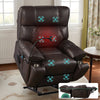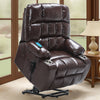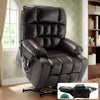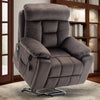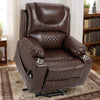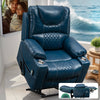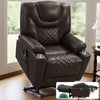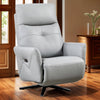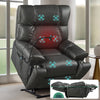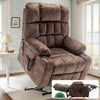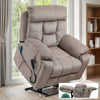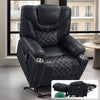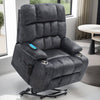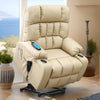Understanding the Unique Health Needs of Tall Seniors
Assessing the Impact of Height on Health and Well-being
Being tall can affect health in various ways as we age. Tall seniors may face unique challenges. These include a higher risk of certain health issues. For example, they may be more prone to back pain and joint problems. This is due to the extra stress on their bodies over time.

Tall seniors might also have a higher risk of certain cancers. However, they often have lower risks of heart disease and diabetes. It's crucial to understand these impacts. This knowledge helps in creating tailored health plans. Regular check-ups are key to monitoring height-related health issues.
Identifying Common Health Challenges for the Tall Elderly
Tall seniors often face specific health challenges. These may include:
- Increased risk of falls due to a higher center of gravity
- Greater likelihood of osteoarthritis, especially in knees and hips
- Higher chances of varicose veins due to blood circulation issues
- More frequent occurrences of back pain and spinal problems
It's important to be aware of these potential issues. This awareness allows for early detection and management. Tall seniors should discuss these risks with their healthcare providers. Together, they can create strategies to address or prevent these challenges.
The Importance of Regular Check-ups and Screenings
Regular health check-ups are crucial for tall seniors. These visits help catch potential issues early. Doctors can monitor height-related health concerns more closely. Screenings may include bone density tests, joint examinations, and heart health assessments.
Tall seniors should also get regular eye exams and hearing tests. These senses can affect balance and fall risk. It's important to keep up with cancer screenings too. Some cancers are more common in taller individuals. Regular check-ups ensure that any health issues are caught and treated early.
Strategies for Maintaining Health and Fitness in Old Age
Building a Personalized Fitness Regime
Creating a tailored fitness plan is key for tall seniors. It should focus on their unique needs and abilities. A good plan might include:

- Low-impact exercises to protect joints
- Strength training to maintain muscle mass
- Balance exercises to reduce fall risk
- Flexibility work to improve mobility
It's important to start slowly and gradually increase intensity. Tall seniors should consult with a fitness expert or physical therapist. They can help design a safe and effective routine. Regular exercise can improve overall health and quality of life for tall seniors.
The Role of Nutrition and Diet in Prolonging Health
A balanced diet is crucial for tall seniors' health. Good nutrition can help manage weight and reduce disease risk. Tall seniors often need more calories than their shorter peers. However, these calories should come from nutrient-dense foods.
Key nutrients for tall seniors include:
- Calcium and vitamin D for bone health
- Protein for muscle maintenance
- Omega-3 fatty acids for heart and brain health
- Fiber for digestive health
Staying hydrated is also important. Tall seniors should aim for a variety of fruits, vegetables, lean proteins, and whole grains. A dietitian can help create a personalized meal plan that meets their unique needs.
Adopting a Positive Mindset for Long-Term Well-Being
Mental health is just as important as physical health for tall seniors. A positive outlook can greatly impact overall well-being. It can help in coping with age-related changes and challenges. Tall seniors should focus on activities that bring joy and purpose.
Strategies for maintaining a positive mindset include:
- Staying socially connected with friends and family
- Engaging in hobbies and learning new skills
- Practicing mindfulness or meditation
- Volunteering or participating in community activities
It's also important to seek help if feeling down or anxious. Mental health support can greatly improve quality of life. A positive attitude can lead to better health outcomes and a more enjoyable aging experience.
The Intersection of Technology and Wellness for Tall Seniors
Leveraging Technology to Improve Health and Independence
Technology can greatly benefit tall seniors in managing their health. There are many devices and apps designed to support senior wellness. These tools can help monitor health, remind about medications, and track fitness goals.

Some useful technologies for tall seniors include:
- Wearable devices to track activity and vital signs
- Smartphone apps for medication reminders and health tracking
- Voice-activated home assistants for hands-free help
- Video calling platforms to stay connected with family and doctors
These technologies can help tall seniors maintain independence. They also provide peace of mind for family members. It's important to choose user-friendly options and get proper training on how to use them.
Innovations in Fitness and Rehabilitation for Seniors
Fitness technology has come a long way in supporting senior health. There are now many options tailored for older adults, including tall seniors. These innovations can make exercise safer and more enjoyable.
Some exciting fitness innovations include:
- Virtual reality exercise programs for immersive workouts
- Smart exercise equipment that adapts to individual needs
- Gamified fitness apps to make exercise more engaging
- Robotics-assisted rehabilitation for recovery from injuries
These technologies can help tall seniors stay active and recover from health issues. They offer new ways to exercise that are both fun and effective. It's important to consult with a healthcare provider before starting any new fitness program.
Ensuring Accessibility to Health Services and Support
Access to health services is crucial for tall seniors. Technology can help bridge gaps in care. Telemedicine is a great option for those who have trouble traveling. It allows for virtual doctor visits from the comfort of home.
Other accessible health services include:
- Online support groups for tall seniors
- Mobile health clinics that can accommodate taller individuals
- Home health monitoring systems
- Delivery services for medications and medical supplies
It's important for healthcare providers to consider the needs of tall seniors. This includes having appropriate equipment and furniture. Big and tall power recliners can provide comfort during long treatments. Accessible health services ensure that tall seniors get the care they need to age gracefully.








